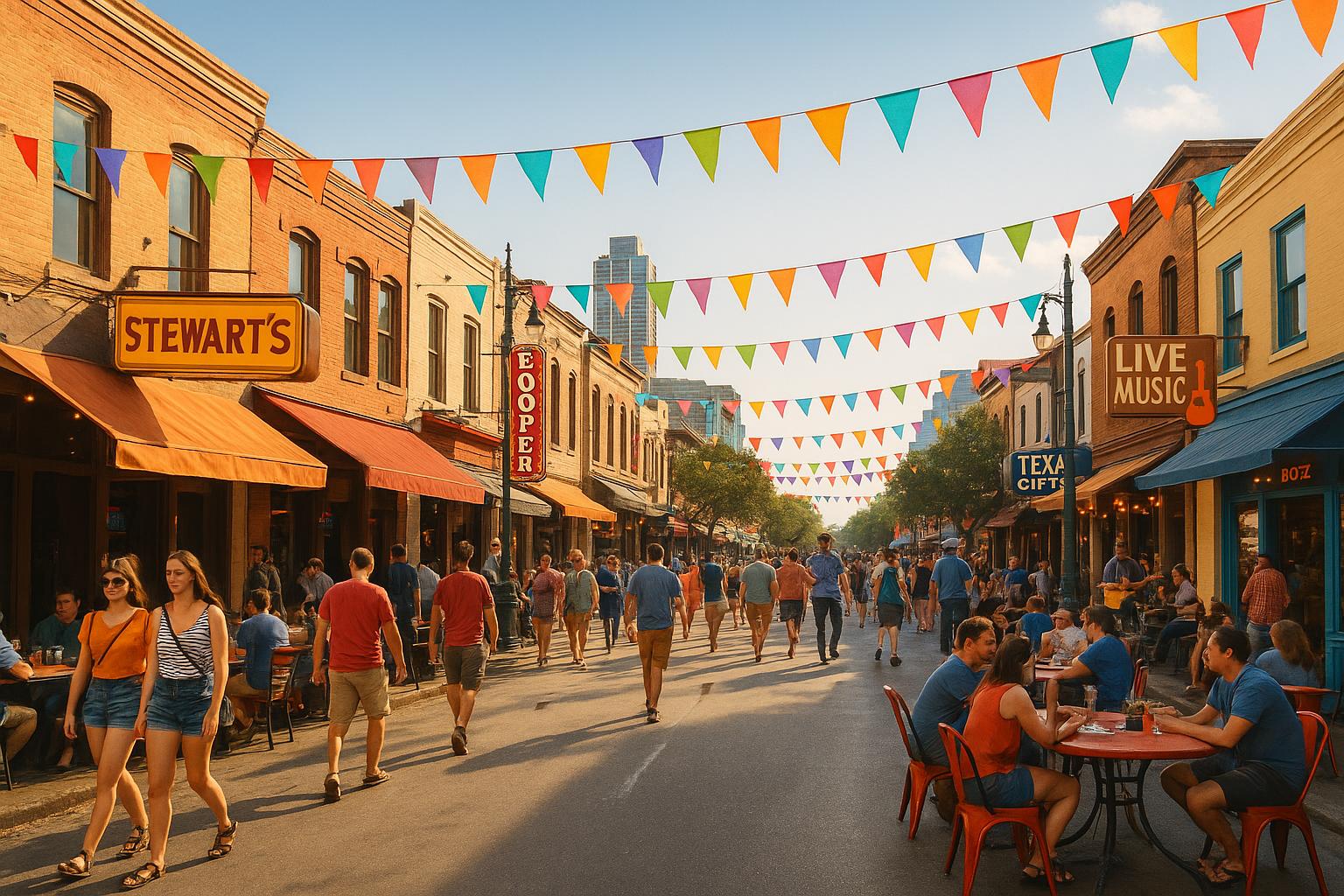Austin’s events, like SXSW, ACL, and Formula 1, create huge opportunities for local businesses to boost visibility through targeted SEO strategies. These events drive specific, time-sensitive searches (e.g., “best tacos near Zilker Park during ACL”), offering businesses a chance to meet high-demand local needs.
By optimizing for event-related keywords, updating Google Business Profiles, and ensuring mobile-friendly content, businesses can attract attendees searching for nearby dining, lodging, or services. Key tactics include:
- Keyword Optimization: Use long-tail, event-specific terms (e.g., “SXSW late-night eats”).
- Event Pages: Create dedicated pages for major festivals with relevant info.
- Google Business Updates: Reflect special hours, services, and event-specific details.
- Mobile Optimization: Ensure fast-loading, user-friendly pages for on-the-go searchers.
- Leverage SERP Features: Focus on local map packs, event packs, and review snippets.
Austin’s vibrant calendar offers businesses year-round opportunities to align SEO with event-driven search behavior, connecting with both locals and visitors.
How Austin Events Drive Local Search Trends
Austin’s busy event calendar isn’t just a draw for attendees – it’s a goldmine for businesses that understand how events influence local search trends. These gatherings create predictable waves of search activity, offering savvy businesses the chance to boost their visibility by aligning their content with what people are actively searching for. Let’s dive into how these events shape time-sensitive search queries and how businesses can tap into these trends.
How Events Create Time-Sensitive Search Queries
When big events come to town, search behavior shifts dramatically. Instead of broad or exploratory searches, people start looking for immediate, location-specific solutions.
Take SXSW, for example. During the festival, search spikes for terms like "24-hour food delivery downtown Austin" or "hotels walking distance to Red River District" reveal the urgency of attendees’ needs. Similarly, during Austin City Limits (ACL), searches like "shuttle service to Zilker Park" and "late checkout hotels Austin" dominate as people try to navigate the city and make their plans work seamlessly.
Formula 1 weekend is another prime example. Queries such as "Circuit of the Americas parking" or "ride share from downtown to COTA" trend heavily, often paired with specific time qualifiers like "open late Sunday night" or "early breakfast before race."
What sets these event-driven searches apart is their urgency and specificity. These aren’t casual inquiries; they’re problem-solving searches made under time pressure. For businesses, this is an opportunity to step in with targeted solutions. By addressing these immediate needs, you can capture highly motivated customers who are ready to act.
Real-Time Keyword Research for Events
If you want to succeed in event-focused SEO, staying on top of real-time search trends is non-negotiable. Tools like SearchX help track keyword patterns as they emerge, giving you a competitive edge during Austin’s major events.
Start monitoring search trends at least two weeks before major events kick off. For instance, during SXSW 2025, searches for "SXSW badge pickup locations" started trending about 10 days before the festival began, while "best breakfast near Convention Center" reached its peak during the first weekend of the event.
Concentrate on long-tail keywords that tie event names to specific needs. Phrases like "ACL festival food options gluten free" or "SXSW venue accessibility wheelchair" often face less competition and attract highly motivated searchers. These types of searches are more likely to convert because they align perfectly with user intent.
When thousands of visitors flood Austin, they’re all looking for answers to similar questions. Businesses that directly address these needs in their content can capture a significant chunk of this valuable traffic. These keyword insights also play a key role in optimizing local search results during events.
Tracking Local SERP Features During Events
Austin’s big events trigger specific SERP (Search Engine Results Page) features that can dramatically boost your visibility – if you know how to optimize for them. Different features become prominent depending on the event, and preparing your content to align with these can help you secure prime search positions.
- Event packs: These snippets showcase details like event times, locations, and activities. For example, during ACL weekend, searches for "Austin live music tonight" often trigger event packs that highlight venues and showtimes.
- Map packs: Location is everything during high-traffic events. Searches such as "coffee shop near Zilker Park" or "parking garage downtown Austin" rely heavily on map pack results. To appear here, make sure your Google Business Profile is up-to-date with accurate hours, location info, and event-specific posts.
- Review snippets: Quick decisions are the norm during events, and recent reviews carry extra weight. Attendees often rely on these snippets to choose restaurants, hotels, or services. Encouraging customer reviews during event periods – and responding to them promptly – can help boost your visibility.
- "People also ask": This section becomes especially active during major events, filling with visitor-specific questions. For instance, during Formula 1 weekend, you’ll see queries about transportation, timing, and logistics. Creating content that answers these questions directly can earn you featured snippet placements, driving significant traffic.
Keep an eye on how these SERP features evolve throughout different event phases – pre-event planning, during-event urgency, and post-event follow-up. Each stage presents unique opportunities to optimize your content and meet shifting search intents. These insights will inform the strategies we’ll explore in upcoming sections on mobile optimization and local listings.
Content and Keyword Optimization for Event Visibility
To attract event-driven traffic, fine-tune your content with smart keyword use, proper schema markup, and dedicated event pages. These strategies can significantly boost your visibility when thousands of people are searching for local services. The key is to naturally integrate precise keywords into your content.
Adding Event-Focused Keywords to Content
Incorporate event-specific keywords seamlessly into your content – no keyword stuffing required. Focus on creating content that genuinely addresses what people are searching for during events.
Start with your meta titles and descriptions. For instance, instead of "Best Coffee Shop in Austin", try "Best Coffee Shop Near SXSW Venues – Open Early for Festival Goers." This aligns your content with event-related searches while reinforcing your local SEO.
Blog content is another great way to tap into event traffic. If you own a restaurant, consider posts like "Quick Lunch Options Between ACL Sets" or "Late Night Dining After Formula 1 Events." These topics naturally include event keywords and provide helpful solutions for attendees.
Even product or service descriptions can benefit from event optimization. A hotel, for example, might update its homepage during ACL weekend to highlight features like proximity to key venues or shuttle services to the festival. Don’t forget to optimize image alt text and captions, such as "crowded restaurant during SXSW 2024" or "hotel lobby decorated for Formula 1 weekend", to help search engines understand your event-related content.
For the best results, start incorporating event keywords about 3–4 weeks before major events. This gives search engines time to index your changes and allows you to capture early planners. Once your keywords are in place, take things further with schema markup.
Using Local Business Schema Markup
Schema markup helps search engines better understand your event offerings, increasing your chances of appearing in rich snippets and local pack results.
For events you’re hosting or promoting, use event schema. For example, if your restaurant introduces a special SXSW menu or extends its hours during ACL, include specific dates, times, and event details in your markup.
Update your LocalBusiness schema to reflect temporary changes like extended hours, special services, or amenities tailored to event attendees. Review and rating schema is also highly effective during events, as fresh reviews and accurate ratings can influence potential customers.
Before a major event kicks off, test your schema markup using Google’s Rich Results Test to ensure everything is set up correctly. After the event, update or remove outdated information to keep your site current and ready for the next opportunity.
Building Dedicated Landing Pages for Major Events
Dedicated landing pages are a powerful way to capture event-driven searches. These pages allow you to focus on specific event keywords without overcrowding your main site and can address the unique needs of event attendees.
For example, if you’re in Austin, create separate pages for major events like SXSW, ACL, and Formula 1. A restaurant’s SXSW page might feature details about extended hours, special menus, reservation policies, and proximity to popular venues.
Use clear, descriptive URLs like "/sxsw-2025-dining" or "/acl-festival-hotel-packages", and link these pages to your main service pages. This structure helps both users and search engines navigate your content effectively while supporting long-term SEO.
Make these pages easy to read, especially for mobile users. Use clear headings, bullet points, and concise paragraphs. Include practical details like parking information, public transportation options, and contact info to help visitors make quick decisions.
Keep these pages updated annually with fresh content and the latest event details. Instead of deleting old pages, archive them to capture long-tail search traffic from users researching past events. Add clear call-to-action buttons, like "Book Your SXSW Stay Now" or "Reserve Your ACL Weekend Table", to encourage immediate engagement from event-goers.
Using Google Business Profile and Local Listings During Events
Your Google Business Profile can be a powerful tool for connecting with potential customers during Austin’s bustling event seasons. When the city hosts major events that draw large crowds, keeping your profile accurate and up-to-date can help you tap into the surge in local search interest. This approach works hand-in-hand with strategies like keyword optimization and mobile search management.
Updating Google Business Profile with Event Details
Before big events, take the time to refresh your Google Business Profile. By aligning your updates with event-focused keywords, you can better attract local traffic. Here’s how to prepare:
- Adjust your operating hours to reflect extended or special schedules.
- Share event updates using posts with clear call-to-action buttons like "Learn More" or "Call Now."
- Add temporary attributes such as free Wi-Fi, outdoor seating, or live music to appeal to event-goers.
- Upload event-themed photos that resonate with the local crowd and highlight your business’s connection to the event.
- Update your business description to emphasize your proximity to event venues and any special services or accommodations for attendees.
These updates ensure your business stands out to both locals and visitors during high-traffic periods.
Listing Events on Local Directories and Calendars
Local directories and event calendars are another great way to boost visibility during events. To make the most of these platforms:
- Add your event-related activities to trusted local directories and community calendars.
- Include detailed descriptions and clear contact information to make it easy for people to find and engage with your offerings.
- Double-check that your business information – name, address, phone number, and website URL – is consistent across all platforms. This consistency helps avoid confusion for both search engines and potential customers.
By leveraging these tools, you can attract more attention to your business and event-related activities.
Managing Reviews During Event Periods
Events often bring an influx of customers, which can lead to a surge in reviews. Managing this feedback effectively is key to maintaining a strong presence. Here’s how to handle reviews during busy event times:
- Be proactive by informing customers about any temporary service changes, so expectations are clear.
- Keep an eye on incoming reviews and respond promptly, especially to negative feedback. A quick, professional reply can help resolve issues and earn trust.
- Encourage satisfied customers to leave reviews by casually mentioning how much their feedback on Google is appreciated.
- After the event, review the feedback to spot recurring themes. These insights can help you fine-tune your strategy and improve your preparations for future events.
sbb-itb-880d5b6
Mobile Optimization and SERP Feature Tracking for Event Audiences
Following our earlier discussion on local keyword and content strategies, let’s talk about something equally important: mobile optimization. During major events in Austin, like South by Southwest (SXSW) or Austin City Limits (ACL), mobile searches skyrocket. Attendees are constantly searching for nearby restaurants, parking options, or services on the go. With mobile devices accounting for 63% of global web traffic and 58% in the U.S. as of October 2024, ensuring your site is mobile-friendly during these high-traffic times is non-negotiable.
Ensuring a Smooth Mobile Experience
Event attendees are usually on the move, juggling schedules between performances or navigating crowded streets. If your mobile site is slow or clunky, they’ll leave – fast. What they need is a site that loads quickly and delivers the essentials without fuss.
Start with responsive design to make sure your site looks great and functions well on any device. Speed is critical, so streamline your mobile experience by highlighting key details like your address, phone number, operating hours, and event-specific information right at the top of your pages. These small tweaks can make a big difference, as mobile-friendly sites tend to see higher conversions.
Beyond the basics, align your content with the specific search behaviors that spike during these events.
Targeting Event-Specific SERP Features
When Austin’s big events roll around, search engine results pages (SERPs) light up with features tailored to local queries. For example, during ACL, searches like "restaurants near Zilker Park" or "coffee shops downtown" often trigger local map packs. If your business isn’t showing up in these results, you’re missing a key opportunity.
To increase your visibility, keep your Google Business Profile up to date with current photos, accurate details, and relevant keywords. This helps your business appear in map packs, review snippets, and even featured snippets for local, event-related searches.
Additionally, create content that answers common event-related questions. Think along the lines of "Where to park during SXSW?" or "Best food trucks near ACL." These types of posts not only engage users but can also land your business in high-visibility SERP positions. Tools like SearchX’s SERP feature tracking can help you monitor which features are appearing for your target keywords as the events unfold.
Once you’ve implemented these strategies, it’s time to measure how well they’re working.
Measuring the Impact of Event-Focused SEO
To gauge the success of your efforts, track metrics like mobile traffic, conversion rates, and local rankings during event periods. Keep an eye on page load speeds and user engagement to catch any issues early.
For example, a spike in bounce rates during an event might point to problems with mobile performance. Dive into your analytics to see if visitors are finding the information they need quickly or if they’re leaving without taking action.
Local search rankings can shift significantly during events due to increased competition. Use tools like SearchX’s keyword research to identify mobile-specific search terms that trend during these times, and monitor your rankings for these keywords. Setting up conversion tracking to distinguish between mobile and desktop users can also provide valuable insights.
Finally, tools for measuring SEO ROI can help you quantify the returns on your mobile optimization efforts. This data is critical for refining your strategy and preparing for future events.
Austin Community Engagement and Local Considerations
Building a strong local SEO presence in Austin means going beyond just technical tweaks – it’s about truly connecting with the community. Austin’s famous motto, “Keep Austin Weird,” isn’t just a quirky slogan; it reflects the city’s love for creativity, individuality, and local pride. Businesses that embrace these values in their strategies are better positioned to thrive in local search results.
Aligning Content with Austin’s Local Community
After addressing technical SEO, focusing on authentic community connections can take your local SEO to the next level. Austin residents appreciate businesses that actively contribute to their community. To resonate with this audience, your content should align with the city’s core values – sustainability, creativity, entrepreneurship, and community support. This approach not only builds trust but also enhances your relevance in local searches.
For example, Austin has a reputation for being environmentally conscious. Highlight your sustainability efforts in your content strategy. Whether you’re running on renewable energy, sourcing ingredients from local farms, or reducing waste, these practices matter to Austin’s eco-aware population. Search terms like "sustainable restaurants Austin" or "eco-friendly services Austin" are consistently popular, offering a chance to attract like-minded customers.
Another way to connect is by showcasing Austin’s creative and culinary culture. Even if your business isn’t directly tied to the arts or food, you can still feature local talent, promote partnerships, or celebrate the city’s vibrant traditions. This not only strengthens your ties to the community but also opens doors for backlinks and content collaborations with local arts organizations.
Finally, weave community involvement into your content. Share stories about your support for local causes, volunteer efforts, or how your business contributes to Austin’s growth. These efforts naturally incorporate local keywords and demonstrate your commitment to the community, which resonates with both search engines and residents.
Participating in or Sponsoring Local Events
Getting involved in Austin’s lively event scene is another powerful way to boost your local SEO while building meaningful community connections. Events provide opportunities for local media coverage, backlinks from event websites, social media mentions, and increased brand recognition – all of which can drive more branded searches and traffic.
Consider sponsoring local events like Eeyore’s Birthday Party, Austin Pride, or neighborhood block parties. These events often generate local press coverage that includes backlinks to sponsor websites, offering great exposure at a relatively low cost.
You can also create event-specific content to maximize your participation. For example, if your business has a booth at the Austin Food + Wine Festival, write a blog post about your experience, share photos on social media, or highlight the local vendors you met. This type of content naturally incorporates local keywords and event-related terms, boosting your visibility.
Collaborating with other businesses is another smart move. Partnering with local companies for event sponsorships or joint booths can expand your reach and reduce costs. These partnerships often lead to cross-promotional opportunities and shared backlinks, benefiting everyone involved.
If direct sponsorship isn’t an option, consider volunteering your expertise. A marketing agency could offer promotional help for an event, while a restaurant might provide catering services. This hands-on involvement deepens your community ties and generates authentic content opportunities.
When possible, host your own events. Whether it’s a networking mixer, charity fundraiser, or workshop, hosting events positions your business as a community leader. These events often attract media attention, social media buzz, and even coverage from local bloggers.
The secret to success in Austin’s community is genuine and consistent engagement. Residents can easily tell the difference between businesses that are truly invested in the community and those that are just jumping on the bandwagon. By staying authentic and committed, you’ll not only strengthen your local SEO but also build lasting relationships with the people who make Austin the unique city it is.
Conclusion: Using Events to Boost Local SEO in Austin
Austin’s vibrant festival scene provides businesses with a unique opportunity to enhance their local SEO efforts. With events like SXSW, Austin City Limits, neighborhood block parties, and food truck festivals happening year-round, there’s a steady stream of search activity that businesses can tap into for greater visibility. To thrive in this dynamic environment, adopting flexible and mobile-focused SEO strategies is essential.
But here’s the thing: event-driven SEO goes beyond simply sprinkling festival names into your content. It’s about understanding search intent, prioritizing mobile-friendly experiences, and connecting authentically with Austin’s community-centric vibe. Aligning your SEO game plan with the city’s bustling event calendar means you’re not just chasing rankings – you’re establishing your business as part of what makes Austin unique.
Mobile optimization plays a massive role, especially during events when people rely on their phones to find nearby restaurants, parking, or services. Businesses that view Austin’s events as ongoing opportunities rather than one-off chances see the best results. This consistent effort builds credibility over time, signaling to search engines that your business is a go-to resource for event-related searches.
One thing to remember: Austin values authenticity. Your SEO strategy should reflect genuine community involvement. Whether it’s sponsoring events, creating helpful guides for festival attendees, or simply being an active participant in local celebrations, these actions build a reputation that resonates with both the community and search engines.
FAQs
How can Austin businesses use SEO to benefit from local events and festivals?
Austin’s lively events and festivals offer a golden chance for businesses to refine their local SEO strategies. Tapping into event-driven search trends can help you connect with potential customers. Here’s how:
- Incorporate event-specific keywords: Include terms tied to big Austin events like SXSW or Austin City Limits in your content. These keywords can help your business show up in searches tied to these popular happenings.
- Make your site mobile-friendly: Event attendees are often on the go, searching for nearby spots on their phones. A fast, mobile-optimized website ensures you don’t miss out on this audience.
- Use local business schema: Add structured data to your website to showcase key details like your location, hours, and special offerings during major events.
By syncing your SEO strategy with Austin’s bustling event calendar, you can boost your visibility and draw in more local customers.
What mobile SEO strategies should businesses in Austin focus on during major events and festivals?
To make the most of your mobile SEO during Austin’s big events and festivals, focus on local keywords and geo-targeted content that match the search habits tied to these happenings. This approach ensures your business shows up in local searches when interest is at its peak.
Make sure your website is mobile-friendly, featuring quick load times and engaging, mobile-optimized visuals like images and videos. Adding event schema markup can also boost your search visibility by presenting clear, structured details about the events.
These tactics can help you grab the attention of Austin’s event-focused audience and strengthen your local search rankings during these high-traffic times.
How can participating in Austin’s local events and festivals improve a business’s visibility and reputation?
Participating in Austin’s local events and festivals can be a game-changer for businesses looking to increase visibility. These gatherings naturally draw in foot traffic, giving you the chance to showcase your brand to a wider audience. Plus, they offer a unique way to connect directly with the local community, helping you build trust and form meaningful relationships with potential customers.
Being part of Austin’s lively cultural scene also sends a strong message about your commitment to the city and its identity. This connection can work wonders for your reputation, fostering customer loyalty and generating positive word-of-mouth buzz. To make the most of these opportunities, consider using event-based marketing tactics – like focusing on local keywords or creating geo-targeted content – to maximize your reach and impact.




